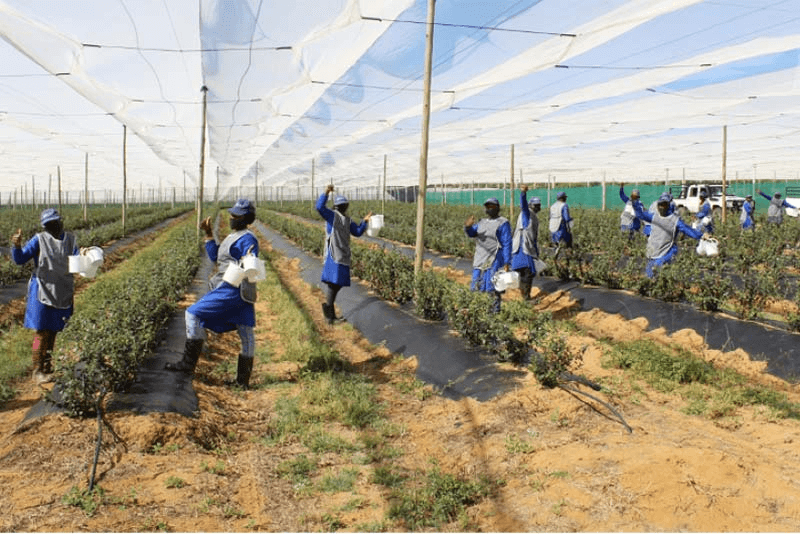Cultivating a Greener Future: The Zamberries Sustainability Story
ZamBerries was founded with a purpose: to grow world-class blueberries while caring for Zambia’s land and people. From the very first plantings, the company has woven sustainability into its mission. By aligning business with social and environmental goals, ZamBerries creates “lasting change for rural communities” farmafrica.org. In practice, this means running a blueberry farm that benefits the earth and empowers local families. Under bright African skies, each dawn at ZamBerries begins with a commitment to soil, water, and community.
Organic & Regenerative Farming
Instead of conventional chemicals, ZamBerries uses organic and regenerative farming to nourish the land. The fields are alive with cover crops, mulch and compost – building rich soil and welcoming earthworms and beneficial microbes. For example, the farm plants cover crops and wildflowers between the blueberry rows. These plants naturally enrich the soil and attract pollinators, so that each harvest is fueled by a living ecosystem. The farm also turns plant waste into compost, recycling nutrients back into the ground smallfarms.oregonstate.edu. “Regenerative” agriculture here means working with nature: the healthy soil and abundant soil life feed the plants. Studies show that perennial crops grown this way – just like blueberry fields – have “beneficial effects on soil, water, biodiversity and climate” frontiersin.org. In short, ZamBerries treats its fields as a growing ecosystem. By avoiding synthetic fertilizers and pesticides, and by keeping the soil covered and resting, the farm continuously rebuilds organic matter and fertility – making the soil more resilient each year.
Cover crops & mulch: A mix of legumes and cover plants grows between rows to feed the soil and shade the ground. This keeps moisture in and cuts erosion.
Composting: Clippings, spent berries and plant waste are composted on-site, efficiently managing waste and cycling nutrients smallfarms.oregonstate.edu.
No synthetic chemicals: Pesticides and herbicides are avoided. Instead, ZamBerries relies on natural pest controls and careful cultivation, protecting the farm’s beneficial insects and fungi.
Saving Water, Sustaining Life
Water is the lifeblood of any farm, and ZamBerries handles it with care. Every irrigation drop is precious. The farm uses efficient drip irrigation systems that gently deliver water right to each plant’s roots. This means almost no runoff or evaporation – water is used where it’s needed. In fact, drip lines can save over half of the water compared to traditional sprinklers netafim.com. Even better, the pumps and controls run on solar power. A solar array on the farm harnesses Zambia’s abundant sun to run the irrigation pumps, making the system carbon-free atmosfair.de.
Drip irrigation: Tubes and emitters apply water directly to blueberry roots, reducing waste. (Netafim irrigation experts note that drip “provides the ideal growing conditions for blueberries” netafim.com.)
Solar-powered pumps: Electricity from rooftop solar panels drives the water pumps, so irrigation is clean and reliable atmosfair.de.
Rainwater catchment: Seasonal rains are captured in storage tanks to supplement irrigation, ensuring more water is always available in dry spells.
Mulching: Thick organic mulch layers around each plant keep soil cool and moist, cutting evaporation even further.
By combining smart technology with nature’s rhythms, ZamBerries protects this precious resource. The result: vibrant bushes even in the dry season, and steady growth without draining rivers.
Clean Energy & Circular Operations
ZamBerries strives for a “zero-waste” farm wherever possible. Along with solar irrigation, the farm meets other needs with renewable energy and circular practices. For example, all farm buildings – from the sorting shed to the offices – are lit and powered by solar panels. This keeps operating emissions near zero. The farm also captures organic waste and returns it to the fields. Pruned vines, undersized berries, and other organic scraps go into compost piles. That “black gold” of compost feeds cover crops and blueberry bushes alike, closing the loop on waste smallfarms.oregonstate.edu.
On-site energy: A solar array powers irrigation, cooling rooms, and packing equipment. This clean energy means sun-grown berries really are sun-powered from start to finish.
Waste recycling: Organic farm waste never goes to landfill. Everything from berry skins to plant prunings is composted or reused, boosting soil health smallfarms.oregonstate.edu.
Eco-friendly materials: Packaging is chosen for minimal environmental impact (recyclable or compostable containers) so even delivery leaves a smaller footprint.
Nurturing Biodiversity
ZamBerries’ farm is not a sterile monoculture but a living landscape. The fields are deliberately interwoven with nature. Around the blueberry rows you’ll find strips of flowering plants and herbs, serving as food for pollinators and friendly insects. This isn’t just pretty – research notes that regenerative, perennial farms tend to be very positive for biodiversity and healthy soil life frontiersin.org. Native trees and shrubs are left along the edges of the farm, providing habitat for birds and other wildlife. By inviting nature in, the farm actually protects itself: birds eat pests, and bees ensure every blossom becomes a blueberry. Importantly, without harmful chemicals, the ecosystem thrives.
Pollinator gardens: Wildflowers and bee-friendly plants bloom beside the fields, supporting honeybees and native bees (key helpers for berry yields).
Habitat preservation: Stands of original forest or woodlot are kept intact on the land, and new native hedges are planted, giving wildlife a safe refuge.
No harmful sprays: Because the farm is organic, every bird, butterfly, and soil microbe is welcomed. This abundance of life makes the entire farm ecosystem stronger.
By farming in harmony with nature, ZamBerries helps restore and protect local biodiversity. The soil stays teeming with beneficial organisms, and the landscape buzzes with life – even as it produces our sweet berries.
Growing Together: Community Partnerships
Behind every berry at ZamBerries is a community story. The company has built deep partnerships with local farmers, schools and villages. ZamBerries provides smallholder farmers with training and resources, not just buying produce. Agronomists from the farm regularly host workshops on sustainable techniques and share planting materials. They’ve launched farmer empowerment programs much like Zambia’s national initiatives: offering quality seedlings, conservation agriculture advice, market insights and even alternative livelihoods such as beekeeping or poultry undp.org.
Farmer training: Local growers learn about sustainable farming methods – from soil care to pest management – so they can improve their own fields and earn more.
Seeds & tools: ZamBerries often supplies improved blueberry varieties and equipment (like irrigation kits) to community cooperatives, mirroring successful development projects that boost yields undp.org.
Fair contracts: Smallholders who sell their berries to ZamBerries get fair prices and prompt payments. This financial support helps families invest in their future.
Local employment: The farm actively hires from nearby villages. As one father said, community jobs allow young people to stay home and support their families, rather than leaving for the city.
In short, ZamBerries’ success is shared. By tying its growth to the well-being of its neighbors, the farm reinforces Zambia’s rural economy. Training sessions raise skills, and new jobs – from fieldwork to packing and even management – provide steady income. This cycle of knowledge transfer and opportunity helps build a stronger, more prosperous community in the region.

Local farmworkers harvest blueberries under sunshades at ZamBerries, illustrating how sustainable practices go hand-in-hand with community empowerment.
From Fields to Futures: Stories of Impact
The human impact of this work is clear in personal stories. Take Pontso Lethena, for example. Pontso started at the farm as a blueberry picker – a stark contrast to her previous job cleaning houses. Today she leads a team of 65 harvesters and proudly supports her two children as a single mother ifc.org. “I love being outside supporting my team,” she says, beaming, noting that her income has risen since joining ZamBerries ifc.org. Her story is echoed by others like Simphiwe, a young man who began picking fruit and now manages 49 workers. He invested his farm earnings to open a small fish-and-chip shop in his village – something he never could have done without the steady work and training on the farm ifc.org.
These stories illustrate the farm’s ripple effect. By helping workers gain skills and confidence, ZamBerries turns a blueberry patch into a launching pad for dreams. A picker becomes a team leader; savings from seasonal wages turn into a new business. This kind of social “harvest” is as important as the berry yield. Every year, more local farmers and workers step into roles they never imagined, lifting families out of subsistence and into active participation in the economy.
Premium Quality, Global Promise
Because ZamBerries invests in the earth and in people, the fruit itself reflects that care. Each blueberry is crisp and flavorful, a result of the farm’s attention to soil and plant health. As one expert notes, the best berries give a satisfying “crunchy pop” and a sweet-tangy taste globalplantgenetics.com – qualities that ZamBerries aims for in every harvest. The cool nights and sunny days of the growing season, combined with organic soil and careful handling, yield berries that travelers and chefs seek worldwide.
Zambian-grown blueberries are carving out a reputation as a premium product. They reach global markets (including China and Europe) carrying not only rich nutrients, but also the story of sustainable Zambia. Consumers and investors alike see that buying ZamBerries means enjoying a delicious fruit and supporting a farm built on values. The berries are traceable to a farm that doesn’t just chase volume, but quality — quality of the crop, the soil, and the community.
Harvesting the Future
ZamBerries’ story is one of balance: environmental stewardship, economic resilience, and high-quality produce all go hand in hand. By farming organically, conserving water, protecting biodiversity, and embracing clean energy, the farm preserves Zambia’s rich landscape for generations to come. By partnering with local people – training them, hiring them, and sharing success – ZamBerries strengthens livelihoods and builds a stronger rural economy. And by bringing fresh, flavorful blueberries to the world, the farm proves that doing business with heart really does produce the sweetest rewards.
In the end, ZamBerries shows that a farm can be so much more than rows of crops. It can be a place where caring for the earth and caring for people grow together, nurturing hope and prosperity.
